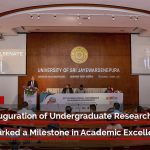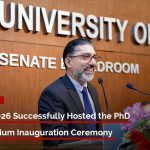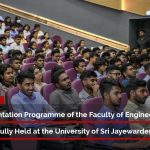The University of Sri Jayewardenepura situated in the heart of Colombo possesses a long and glorious history. Having been established in 1959 at Gangodawila, its roots can be traced back to the Vidyodaya Pirivena established in 1873 by Most Ven. Hikkaduwe Sri Sumangala Thera at Maligakanda. Today the University pays homage to 60 years of history while paying tribute to the journey of 145 years.
The University of Sri Jayewardenepura ably led by Vice-Chancellor Senior Prof. Sudantha Liyanage stands strong with eight faculties, Faculty of Humanities and Social Sciences, Faculty of Applied Sciences, Faculty of Management Studies and Commerce, Faculty of Medical Sciences, Faculty of Graduate Studies, Faculty of Engineering, Faculty of Technology and its latest addition Faculty of Allied Health Sciences. The University is home to over 12,000 Undergraduates and over 1,000 postgraduate students. It is considered the largest University in terms of student population in Sri Lanka.
Contribution to higher learning
Meanwhile the Faculty of Humanities and Social Sciences of the University marks another milestone in its outstanding contribution to higher learning in the country, by commencing its new academic year with the advent of the New Year, 2022. Faculty Dean Prof. Shirantha Heenkenda, provides overall strategic leadership and direction to Faculty on all undergraduate and graduate academic programmes, experiential learning opportunities, and pathway initiatives.
The Faculty which was initially named the Faculty of Arts at the establishment of the University of Sri Jayewardenepura in 1977, was officially renamed as the Faculty of Humanities and Social Sciences in 2012, highlighting its commitment to the needs of the country.
Prof. Shirantha Heenkenda stated that at present the Faculty has Academic Departments specialized in areas of Criminology, Economics, Political Science, Anthropology, Sociology, History and Archaeology, Sinhala and Mass Communication, Philosophy and Psychology, English and Linguistics, Music and Creative Technology, Cultural Studies and Performing Arts, Geography, Information and Communication Technology, Pali and Buddhist Studies and Social Statistics. These Academic Departments currently offer degrees under 34 academic fields, conducted in both media of Sinhala and English. The Department of English Language Teaching (DELT) conducts general English Language programmes for the student community of the Faculty.
‘Prosper Lives through Learning’
Prof. Heenkenda further added that in keeping with the vision of the University, ‘Prosper Lives through Learning’, the Faculty also conducts three degree programmes for the students who have not gained admission to the university. With the aim of achieving the goal of providing education for all, the Faculty offer at least 30 Diploma programmes.
A variety of new degree programmes in concurrence with the revision of curricula of all the course modules, exceeding 800 in number, have been made available for the internal students. Accordingly, the curricula are revised to align with the Integrated Learning Outcomes (ILOs) and with the intellect and skills needed for the world of 21st Century. As such, there are new undergraduate degree programmes in Financial Economics, Social Work, Philosophy, Psychology, as well as Tourism and Heritage Management. Furthermore, two new degree programmes have commenced – Bachelor of Arts in Information Technology and Bachelor of Science in Information Technology, in addition to another new degree programme in Geo-Spatial Technology.
“Since we believe in the importance of a knowledge of languages in the modern world, we have also introduced honours degrees in French, Chinese and Japanese, while also heading towards a new pathway through an honours degree programme in Music and Creative Technology,” Prof. Heenkenda added.
Prof. Heenkenda said that a revision of the course structure in the course modules offered was effected. “Accordingly, we have increased the credit weight of General English from 02 to 09 credits and made General English a compulsory subject for all students of our Faculty. Considering the importance of the subject of Information Technology, we have increased its credit value from 03 to 09 credits. These changes were triggered by our concern about the issue of improving employability. Prior to directing the undergraduates of the final year honours degree programmes, to their Internships, they are given training in new trends of the corporate world. In this context, we have also provided the students with an opportunity to gain knowledge and training in Entrepreneurship, in case a student intends to become an entrepreneur”, he said.
Moreover, the Faculty has made it compulsory for all its undergraduate students to offer courses such as Basic Mathematics, Intelligent Quotient (IQ) Basics and Sri Lankan Society because the Faculty believes that the students must be led towards new dimensions in education.
The Centre for Digital Education and Professional Development (CDEPD) was newly established. The centre operates in four main areas: digital education and resource provisioning, offering a wide range of courses and course units, professional development, IT services and e-learning. Accordingly, diploma courses in English and Applied Tamil language, mental and spiritual development programmes, information technology for professional life, research methodology, special workshops, and external lectures are organised for internal students.
The unit has initiated teacher training programmes and courses for the online teaching process which was introduced in the COVID-19 environment. Furthermore, there is a Brilliants Minds competition series that operates in two main streams. One of these streams includes the Multiple Intelligence Challenge, and it enables developing general knowledge and mathematical skills of undergraduates to face professional competitive examinations. The second is the Subhasha programme. Its primary objective is to develop Sinhala language skills of students.
The EntreClub, Entrepreneurship Development Unit of the Faculty conducts workshops and provides guidance on developing entrepreneurial skills of students. Undergraduates selected from the annual ‘Business Idea Competition’ will be invited to participate in programmes involving financial institutions such as the National Entrepreneurship Development Authority, the private sector and banks to inculcate their ideas in the business world. This will give them the opportunity to receive further training and advice. There is also the opportunity to pursue a Certificate Course in Entrepreneurship while studying at the university.
A distinctive feature of this Faculty is that its students are offered the possibility of obtaining both a Diploma in English and Applied Tamil language before completing their degree. Also, the University Grants Commission (UGC) is in the process of awarding a Diploma in Information Technology for students studying in the Faculty of Humanities and Social Sciences. A Library and Science Certificate Course will be introduced this year.
The Equal Opportunity Cell has launched various projects to enhance the academic quality and welfare of students with special needs, with the ‘Audio Books’ project taking the lead. This project involves translating works for visually impaired students into audio-visual media. The ‘Dream’ scholarship scheme is also launched for them.
Student counselling and welfare
Apart from this, there are several initiatives such as the Green Hub which conducts various programmes designed for an eco-friendly world, the Centre for Gender Equality and Equity which is based on the foundation of gender equality and the Faculty Publications Committee which facilitates academic and student publications to promote knowledge and encouragement on literary publications. There are several committees in the Faculty, such as the ‘Student Support Centre’ established for student counselling and welfare. The academics in the Faculty provide support to these projects. The International Centre for Multidisciplinary Studies has been established at the Faculty to orient the Faculty community towards academic research. Several research sessions are organised annually under various themes. The ‘Vidyodaya Undergraduate Research Day’ is particularly known as a platform designed to present research of students.
The Faculty Cultural Committee consists of various sub-committees, namely, the Faculty Cultural Committee, Creative Competition, the Faculty Publication Committee, and divisions such as Music and Entertainment, Performing Arts and Culture and National Heritage. The ‘Ranrasu Festival of Art’ is also organised annually by the Faculty Cultural Committee for the development and evaluation of the creative artistic talents of students. Moreover, various awards and gold stamps are presented annually, including the Dean’s Honours List to evaluate students’ academic excellence, leadership, entrepreneurship, essential skills and creative talent.
“The Faculty of Humanities and Social Sciences at the University of Sri Jayewardenepura has incorporated new trends and dimensions, adapting various events to suit the new world. The fact that our Faculty has been able to break away from the traditional framework of society and transform the field of Humanities and Social Sciences into a field of study relevant to the 21st Century is an immense achievement. There is no other pleasure than producing a dynamic graduate who is armed with knowledge, attitudes, and skills which are indispensable within a professional context,” Prof. Shirantha Heenkenda observed.

Article by Dinuli Francisco.
Originally published in Daily News.








